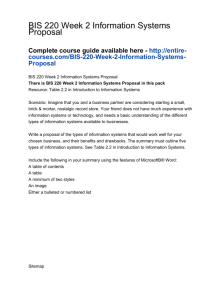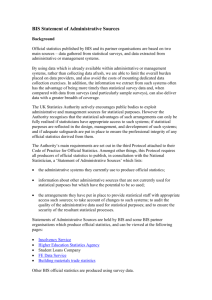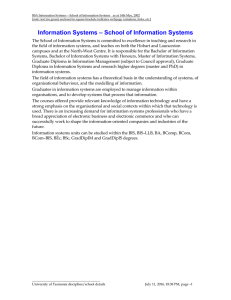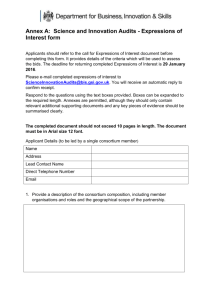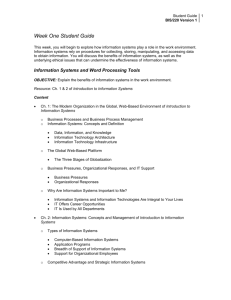Program/Department Annual Update 2008-09
advertisement
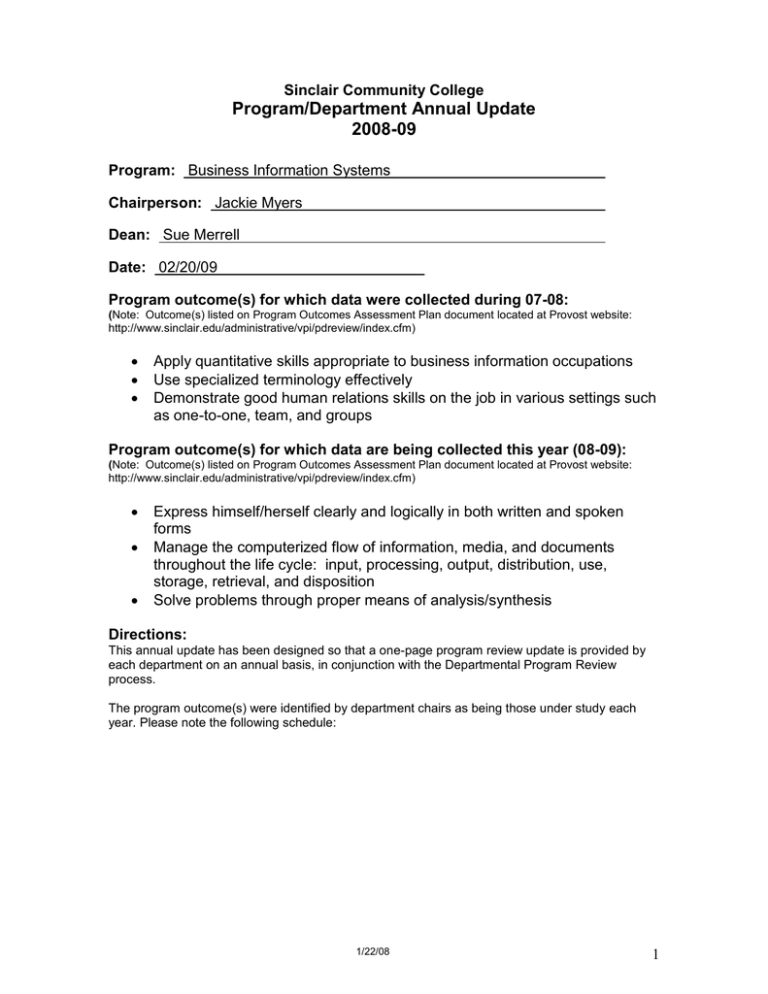
Sinclair Community College Program/Department Annual Update 2008-09 Program: Business Information Systems Chairperson: Jackie Myers Dean: Sue Merrell Date: 02/20/09 Program outcome(s) for which data were collected during 07-08: (Note: Outcome(s) listed on Program Outcomes Assessment Plan document located at Provost website: http://www.sinclair.edu/administrative/vpi/pdreview/index.cfm) Apply quantitative skills appropriate to business information occupations Use specialized terminology effectively Demonstrate good human relations skills on the job in various settings such as one-to-one, team, and groups Program outcome(s) for which data are being collected this year (08-09): (Note: Outcome(s) listed on Program Outcomes Assessment Plan document located at Provost website: http://www.sinclair.edu/administrative/vpi/pdreview/index.cfm) Express himself/herself clearly and logically in both written and spoken forms Manage the computerized flow of information, media, and documents throughout the life cycle: input, processing, output, distribution, use, storage, retrieval, and disposition Solve problems through proper means of analysis/synthesis Directions: This annual update has been designed so that a one-page program review update is provided by each department on an annual basis, in conjunction with the Departmental Program Review process. The program outcome(s) were identified by department chairs as being those under study each year. Please note the following schedule: 1/22/08 1 Program Outcomes Exhibit appropriate professional attitude and work ethics related to situations in business and industry; understand customer service requirements within the work setting. Perform applicable technical skills (keyboarding, application software competency, software integration, transcription) and non-technical skills (decisionmaking, planning, time management). Demonstrate proficiency with computer technology at a level compatible with business/industry requirements Apply quantitative skills appropriate to business information occupations Use specialized terminology effectively Demonstrate good human relations skills on the job in various settings such as one-toone, team, and groups. 06-07 07-08 08-09 Direct measure data are collected BIS 215 & BIS 270 Direct measure data are analyzed Document improvements Direct measure data are collected BIS 215 Direct measure data are analyzed Document improvements Direct measure data are collected BIS 215 Direct measure data are analyzed Document improvements Direct measure data are collected BIS 215 Direct measure data are collected BIS 215 & BIS 251-252 Direct measure data are collected BIS 215 Direct measure data are analyzed Document improvements Direct measure data are analyzed Document improvements Direct measure data are analyzed Document improvements Direct measure data are collected BIS 215 Direct measure data are analyzed Document improvements Direct measure data are collected BIS 215 Direct measure data are analyzed Document improvements Direct measure data are collected BIS 215 Direct measure data are analyzed Document improvements Express himself/herself clearly and logically in both written and spoken forms. Manage the computerized flow of information, media, and documents throughout the life cycle: input, processing, output, distribution, use, storage, retrieval, and disposition Solve problems through proper means of analysis/synthesis. 09-10 10-11 Please e-mail this completed form to angie.didier@sinclair.edu by March 3, 2009. Thank you. Please list noteworthy changes in the data set from last year: There was an increase in program enrollment from 553 in 2006 to 801 in 2007. The majority of the increases were in two certificates, Business Information Systems Medical Office Specialist and Software Application for the Professional. This correlates with the increase in graduates from 69 in 2006 to 129 in 2007. The majority of the increases were in the same two certificates. I believe these increases were due to the change in how Registration processes completed certificates and degrees. Students no longer need to apply and pay a fee. 1/22/08 2 Please list the actions and/or improvement priorities underway from the most recent program review recommendations: Recommendations for Action from 2004-05: 1. Develop a systematic process to ensure internal and external stakeholder needs are met. Incorporate student input when developing improvement plans to ensure understanding of learner needs. 2. Determine the impact of curricular changes on individual BIS students and the achievement of course and program level outcomes. For instance, has the addition of ENG 199 increased student success in sequel courses and the program? 3. Help BIS students make good selections when choosing computer courses: Continue efforts to improve advising for BIS learners; develop communications for students and counselors to clarify which course/module best serves entrylevel learners; develop an entry-level skill pre-assessment to guide student course selection and improve student success. For item 1 above—we use meetings with our BIS Advisory Board members and quarterly feedback forms and visits to internship worksite supervisors and interns to solicit input about the skills necessary to be successful in the workplace and to ensure our programs align with job opportunities in the workplace. For item 2 above—through advisory board meetings and quarterly feedback forms and visits with interns, we have determined that students are missing course material needed to be more successful in courses and in the workplace due to the deactivation of some courses. Student success in both BIS 251 and BIS 252, Medical Transcription I & II, between 2006-2008 is approximately 87%, which is above average. However, in discussions with students, they felt unprepared for these classes. It was determined the course materials from BIS 250, Medical Transcription Skills (course deactivated in Fall, 2004), was the missing material they needed. Effective Winter, 2009, we incorporated the materials from BIS 250 into BIS 251 and will monitor the impact this has on student success in BIS 251 and BIS 252. Data to assess the impact of adding ENG 199 as a prerequisite for BIS 251 is not available and student feedback does not indicate that it is helpful. Effective, Fall, 2008, we reactivated BIS 116, Medical Office Procedures, and will add it back into the degree program effective Fall, 2009. This course provides principles and responsibilities pertinent to a medical office and health care agencies and this is important for our medical office degree option students to be successful in the workplace. For item 3 above—the chairperson for BIS communicates changes to courses and programs to the Business Counselors through email and meetings so they have current information for advising students. The counselors send emails 1/22/08 3 about changes to the appropriate degree seeking students. The BIS Department website is updated with changes to courses and programs. Effective, Fall 2007, we began offering the BIS 104, Intro to PC Usage, as a flex course, starting one week after the quarter start date to allow students inappropriately placed in BIS 160, Introduction to Word, Excel, and PowerPoint, to be placed into a more appropriate course. The BIS Department is working with the Testing Center personnel regarding the AccuPlacer Placements tests taken by new Sinclair students. AccuPlacer has a computer literacy test that can provide assessment of entry-level computer skills so students, counselors, and faculty can improve course selection and student success. The BIS Department has secured a web-based proficiency test for BIS 160, a general education computer literacy course for Sinclair students, that will be pilot tested during Spring, 2009, with tech prep students from the Miami Valley Tech Prep Consortium. Program outcome(s)--data collected in 06-07 What actions/improvements are underway as a result of your data analysis? Analysis of the data collected in 06-07 indicates the student success was above average for the outcomes so no actions/improvements are currently underway. Program outcome(s)--data collected in 07-08 How have you analyzed the data collected? What did you find? Describe the results obtained. Assessments were grouped by outcome and then averaged for two sections of BIS 215 (Fall 2007 and Spring 2008) based on various projects the students completed and one section of BIS 215 for Fall 2008 based on student completion of a job simulation. For BIS 251 (Fall 2007 and Winter 2008) and BIS 252 (Winter 2008), final course grades were used to determine student mastery of use of specialized terminology. Due to a change in instructor, detailed data were not available to analyze to determine what part of the student grade was from use of specialized terminology and what part from proper use of English language skills. For the outcome—apply quantitative skills appropriate to business information occupations—students averaged 79%. Analysis of the work from Fall 2007 and Spring 2008 showed the reduction in points earned was more from formatting and spelling errors than from quantitative skills. Therefore, student average was actually higher than 79% and overall the students performed at an average level. Analysis of the work from Fall 2008 where students completed a job 1/22/08 4 simulation showed their mastery level at 100% (any reduction in points was from formatting or spelling errors). For the outcome—use specialized terminology effectively—students success rate averaged 86.5% in 2007-2008, a decrease from an average of 87.5% in 2006-2007 and a decrease from an average of 98% in 2005-2006. Student success in both BIS 251 and BIS 252, Medical Transcription I & II, between 2006-2008 is approximately 87%, which is above average. However, in discussions with students, they felt unprepared for these classes. It was determined the course materials from BIS 250, Medical Transcription Skills (course deactivated Fall, 2004), was the missing material they needed. Effective Winter, 2009, we incorporated the materials from BIS 250 into BIS 251 and will monitor the impact this has on student success in BIS 251 and BIS 252. Data to assess the impact of adding ENG 199 as a prerequisite for BIS 251 is not available and student feedback does not indicate that it is helpful. For the outcome—demonstrate good human relations skills on the job in various settings such as one-to-one, team, and groups—students averaged 89% for course participation in Fall 2007 and Spring 2008. Analysis did not provide detail to break down the participate by one-to-one, team, and groups. Analysis of the work from Fall 2008 where students completed a job simulation showed their skills in team and group work to be 100%. Program outcome(s)—data collected for 08-09 For the outcome(s) currently under study (for 08-09 outcomes), what evidence and process do you plan to use to determine the extent to which this/these program outcome(s) have been met? In BIS 215, completion of a job simulation will be used to assess students’ abilities in these program outcomes. Note: Next year, you will be asked to describe the analysis (08-09 outcomes), and actions/improvements underway (07-08 outcomes). General Education Describe any general education changes/improvements in your program/department during this past academic year (07-08). In relation to the computer literacy piece of the general education courses, effective, Fall 2007, we began offering the BIS 104, Intro to PC Usage, as a flex course. This course starts one week after the quarter start date to allow students inappropriately placed in BIS 160, Introduction to Word, Excel, and PowerPoint, to be placed into a more appropriate course. The BIS Department is working with the Testing Center personnel regarding the AccuPlacer 1/22/08 5 Placements tests taken by new Sinclair students. AccuPlacer has a computer literacy test that can provide assessment of entry-level computer skills so students, counselors, and faculty can improve course selection and student success. The BIS Department has secured a web-based proficiency test for BIS 160, a general education computer literacy course for Sinclair students, that will be pilot tested during Spring, 2009, with tech prep students from the Miami Valley Tech Prep Consortium. 1/22/08 6
